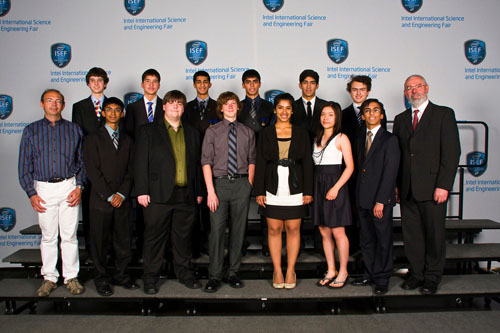For the third year, CERN hosted in June the visit of 12
pre-college students who won the CERN Special Award at the Intel
International Science and Engineering Fair (ISEF) 2011. The
Intel ISEF is the world's largest international pre-college
science competition offering a yearly forum for more than 1,500
high school students from over 65 countries to showcase their
independent research tackling challenging scientific questions.
The organizer, ‘Society for Science & the Public’, partners with
Intel, along with dozens of other corporate, academic,
government and science-focused sponsors, to reward the best
students, all winners of national competitions.
The CERN Special Award was established in 2009, when Craig
Barrett, Intel’s chairman of the Board at the time, visited CERN
as part of Intel’s partnership in CERN openlab. Craig Barrett
and Wolfgang von Rüden, former IT Department Head, defined the
award as a 5-day trip to CERN for 12 students, co-funded by CERN
and Intel. The first students came to CERN in June 2009. Now in
its third year, this Special Award proves to be extremely
popular. The award winners went through a thorough selection
process. Applicants had to excel in an online test before being
reviewed by Alberto Pace and Wolfgang von Rüden at the fair in
Los Angeles. The final selection was based on their evaluation
of the students’ projects and on individual interviews.
 The
2011 Intel-ISEF CERN Special Award winners, with judges Alberto
Pace (left) and Wolfgang von Rüden (right). (Image credit:
Society for Science & the Public.)
The
2011 Intel-ISEF CERN Special Award winners, with judges Alberto
Pace (left) and Wolfgang von Rüden (right). (Image credit:
Society for Science & the Public.)
This year’s winners are: Arjun Aggarwal, David Alexandre Joseph
Campeau, Brian Ronal Graham, Emil Timergalievich Khabiboulline,
Jayanth Krishnan, Pratheek Nagaraj, Nicholas James Nothom, Sahir
Raoof, Kamal Shah, Andrey Sushko, Aishwarya Ananda Vardhana and
Nicole Yeechi Tsai. Despite their young age, all are already
well-acquainted with science, having done projects covering
topics as diverse as ‘Anthropometric Interactive Robot with
Vision Intelligence & Speech’, ‘Regulatory Signatures of Cancer
Cell Lines Inferred from Gene Expression Data’ and ‘Method of
Optimizing the Monte Carlo Statistical Algorithm to Increase
Computational Efficiency in Multidimensional Integration’, to
name just a few. One finalist even built an electron accelerator
in his basement.
The students visited the Large Hadron Collider facility and
enjoyed presentations from various prominent physicists and
engineers. They particularly appreciated a few hours of
individual coaching by a scientist on a topic selected by the
student. Visits to Geneva, EPFL and the region were also part of
their programme.
"We are all very impressed by the high level and the quality of
their projects", explains Wolfgang von Rüden, who hosted the
visit. "It is a real pleasure to be with these bright students
and it is a great satisfaction to witness that each year several
decide to move into physics after visiting CERN".
He also stressed the strong partnership Intel and CERN built
over the years since the start of CERN openlab in 2001. Intel
not only collaborates on computing projects but also supports
the CERN openlab Summer Student Programme. In fact, after just
one year at university, one of the 2010 ISEF award winners
qualified to join this programme.
=======================================================================
Further details about the visit programme, the students and
their projects are available in the following websites and
articles:
Schedule for
ISEF2011 students visit to CERN
CERN Bulletin Issue:
28/2011 & 29/2011, Mon 11 Jul 2011, BUL-NA-2011-176
Interviews of the CERN Special Award winners 2011 on the CMS
experiment YouTube TV.
Eliza McNitt, ISEF winner in 2009,
produced this documentary
about her group's visit.
